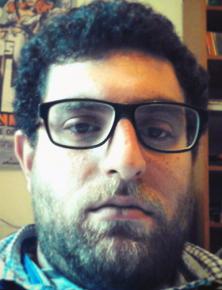A tenacious and creative fighter
pays tribute to a Lebanese socialist remembered for his fighting spirit.
THE LEFT lost a dedicated fighter last week with the death of Lebanese revolutionary socialist Bassem Chit of a heart attack at the young age of 34. Fearless and full of energy and excitement, Bassem left an impact on everybody he touched.
I always looked forward to catching up with Bassem every time I was in Lebanon. I sometimes found it challenging to understand the prevailing sectarianism in Lebanese society and to counter it in my daily interactions. Every struggle, every movement, every demand for change seemed to be dismissed on sectarian grounds: the minister belongs to this sect; the workers are from this other sect; these key positions are held by this sectarian party; this union is under the influence of this secular party, which is today allied with that sectarian party; the demands of this movement may sound legitimate, but it would upset the balance with this other sect; and on and on.
But Bassem had a remarkable ability to break down complex issues and shed light on them in a clear, accessible manner. He would patiently, yet very passionately, explain that sectarianism is a product of capitalist relations in Lebanon; that all struggles of the oppressed deserved our support; and that to overthrow this capitalist sectarian system, we need a revolutionary party. Indeed, the day he left us, he was scheduled to give a talk to university students on "The Marxist analysis of social classes in Lebanon."

Bassem's conviction was contagious. His sharp analysis was indispensable to figuring out a perspective and the next steps for the left. As his friends have said, he was a reference point to many of us. He gave us hope.
"Bassem could capture your imagination with a passion that forced you to rethink many existing explanations, or simply reject dominant paradigms altogether," wrote Moroccan activist Miriyam Aouragh for RS21. "Wherever he went, his interventions and contributions left a mark."
Bassem was a consistent opponent of imperialism, sectarianism, clientelism and everything that weakens and divides the working class. He fought for his ideas tenaciously. This put him in conflict with other leftists/nationalists/secularists, who opportunistically compromised with sectarian Lebanese politics.
He also disagreed with those who saw that any of the Arab regimes were allies in the liberation of Palestine. According to Bassem, Zionism would not be defeated without the overthrow of Syrian dictator Bashar al-Assad, the monarchs of the Gulf and the rest of the regimes that the Arab revolutionaries rose up against in 2011.
IT WAS these relations of geopolitics, patronage and limits of what is permissible that Bassem himself rebelled against. He stood on the side of the oppressed, no matter how difficult or dangerous that position was. As one of his friends said in a tribute, "Bassem won the hatred of some and the admiration of many more."
Sawt Al Niswa (Voice of the Women), an independent feminist webspace, thanked Bassem for generously giving his time and support for their project. They remembered him with these words:
In a country and region increasingly sectarianized, segregated and besieged, and in dire need for radical action against racism, economic and political oppressions, Bassem continuously helped fight for the rights of the oppressed, the ostracized, the disenfranchised and the marginalized--not out of charity, but out of solidarity. For Bassem believed that the struggle for economic and social justice and the dismantling of the capitalist system and its neoliberal agenda were integrally linked to the claiming and defense of personal and political rights for everyone, everywhere.
With a sharp intellect and boundless energy, Bassem was an adept Marxist activist, as highly effective in theoretical debates as in concrete organizing. He worked tirelessly to ensure the continuous production of Permanent Revolution, the collaborative Arabic-language theoretical journal of revolutionary Marxism, which features analysis from across the region: Morocco, Tunisia, Egypt, Jordan, Lebanon, Syria, Iraq, through to the Gulf and Iran.
His comrades in the Socialist Forum in Lebanon mourned him, saying that Bassem dedicated his life to the "liberation of humanity from all forms of hegemony, occupation and oppression. With his sudden departure, we lost more than a rare revolutionary activist. We also lost a unique leader with very creative initiatives. It will not be easy at all to fill the huge vacuum of his absence."
That absence is felt beyond Lebanon. The Revolutionary Socialists in Egypt paid tribute to Bassem, writing:
It is no exaggeration to say that Bassem Chit gave his life [to] the cause of revolution and solidarity with the victims of oppression. He gave his life to the struggle against sectarianism in Lebanon and the Arab world, and to solidarity with the Palestinian people and their struggle for liberation, to the cause of the Syrian people and their revolution, and to expose the plight of refugees in Lebanon. He was a genuine internationalist fighter, who saw socialism as an achievable dream and a real hope, not only in Lebanon but the whole world: for humanity free from sectarianism, racism and false divisions.
Bassem was a towering figure on the Arab revolutionary Left. He had the unique ability to coordinate the issuing of a statement on behalf of revolutionary organizations in different countries and complete all the necessary discussions and corrections in half a day...
We have lost a tremendous fighting spirit. We have lost a keen revolutionary intelligence. We have lost the theoretical and political contributions we were expecting from him in the long term.
Bassem will be sorely missed. He was taken from us way too early. To his family and his comrades, we send our deepest condolences.
And in the memory of Bassem, we renew our commitment to revolutionary socialism and to the realization of his dream and vision of a world where humans live in dignity, free from oppression and exploitation.


